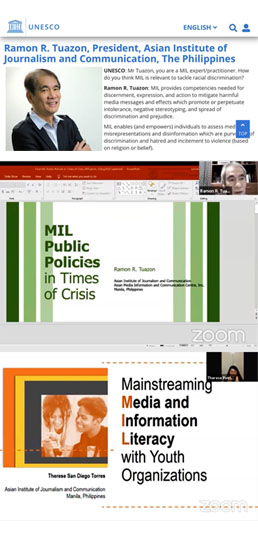AIJC participates in online UNESCO IFAP Conference in August 2020


AIJC participates in online UNESCO IFAP Conference in August 2020
AIJC President Ramon R. Tuazon and Program Officer Therese San Diego Torres were invited to present a paper and participate in the “Three-Day Online International Conference on Access to Information in Time of Crisis – The UNESCO Information for All Programme (IFAP) Priorities and the COVID-19 Pandemic” on 26-28 August 2020. Torres and Tuazon presented papers on media and information literacy (MIL).
Tuazon presented his paper, “MIL Public Policies in Times of Crisis,” where he emphasized the importance of a policy framework in harnessing the potential of MIL and facilitating the enjoyment and exercise of media freedoms and rights. At the same time, he cautioned against MIL-related policies being co-opted in the pretext of preventing disinformation.
Tuazon gave the following recommendations:
- The adoption of a National MIL Policy Framework should be pursued. It should cover communication-related sectors to achieve coherence and consistency in policy and program planning and implementation.
- MIL policies should intersect with development sectors as media, information and technology are drivers of progress in these areas – education and literacy, health, gender and development, peace and reconciliation.
- Youth involvement must be a prerequisite in all policy and program development. Not only are young people the major users and producers of media and information, their participation also provides a platform for civic engagement and leadership.
- Transnational and national technology companies should be targets of MIL policy advocacy, especially since their policies, programs, and services have significant impact on individuals and societies.
- There is a need to pursue new and emerging research areas to make informed MIL policies and programs. These areas include Social Media Effects and Impact, Disinformation Studies, Community Standards and Policies, and Economic Opportunities and Digital Platforms. Research approaches must evolve from interdisciplinary and multidisciplinary to transdisciplinary. We should also do more meta-research to establish correlations and patterns.
Torres presented her paper, “Mainstreaming Media and Information Literacy (MIL) with Youth Organizations,” and discussed the potential of the Filipino youth in developing MIL policies beyond formal education.
She noted that MIL policy is needed to address the gaps in MIL mainstreaming for a number of reasons: (1) the spread of false information or “infodemic” on social media, the primary source of information for millions of Filipinos; (2) the enactment of laws that may be used to either prevent disinformation or curtail freedom of expression/stifle dissent; and (3) the sudden shift to online learning, which raises issues on not only access to technology and connectivity, but also student readiness and responsibility in the face of digital distractions and threats.
Torres made the following recommendations:
- Sustain MIL mainstreaming through the integration of MIL policies in youth organizations. Mainstreaming media and information literacy into policies and programs of youth organizations will enable young people to reach not only their peers but also the larger community.
- Encourage the youth to find creative ways to address misinformation. Young people can play a key role in combating misinformation by promoting analytical thinking over quick judgments on various issues. They can educate each other, and other citizens, on how to manage their biases.
- Place more emphasis on intercultural dialogue and diversity of voices in the MIL Framework in Youth Civic Engagement, and amplify voices from all communities—with or without internet access. The use of new/social media as well as traditional and folk media in mainstreaming MIL will help ensure that connected and disconnected communities will be reached and heard.
The conference was organized by the India Centre for Information Ethics at the University of Hyderabad India; the Russian National IFAP Committee, Interregional Library Cooperation Centre (Russian Federation); the African Centre for Information Ethics at the University of Pretoria, South Africa; and the UNESCO Chair on Language Policies for Multilingualism, University of Santa Catarina (Brazil).
